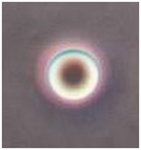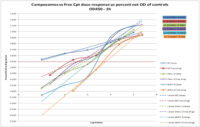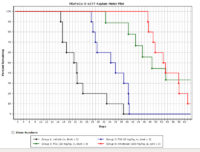A nanosomal formulation of camptothecin, a potent topoisomerase I inhibitor, for colorectal and pancreatic cancers
Camptothecin – A Unique and Potent Topoisomerase 1 Inhibitor
 Camptothecin is an antitumor alkaloid that is isolated from the bark and stems wood of Camptotheca acuminata, a small tree native to China called the “Tree of Life,” by the Chinese who preserved it through the ages for medicinal reasons. The tree was bought to the US in the early part of the 20th century and its anticancer properties were discovered by the National Cancer Institute (NCI) in the late 1950s.
Camptothecin is an antitumor alkaloid that is isolated from the bark and stems wood of Camptotheca acuminata, a small tree native to China called the “Tree of Life,” by the Chinese who preserved it through the ages for medicinal reasons. The tree was bought to the US in the early part of the 20th century and its anticancer properties were discovered by the National Cancer Institute (NCI) in the late 1950s.
Camptothecin displays unprecedented antitumor activities against leukemia, human colon cancer and a variety of solid tumor systems. In particular, it was discovered that camptothecin traps the cleavable complex between topoisomerase I and DNA. Camptothecin is a unique topoisomerase I inhibitor which, while very effective, is not yet completely understood. In addition to its potent anticancer activity, camptothecin inhibits the replication of HIV and other viruses.
Poor Water Solubility Limiting Full Therapeutic Efficacy
The full therapeutic activity of camptothecin has been limited by poor water solubility and aqueous instability of the lactone ring moiety. Ring-opening causes loss of biological activity of this compound. Preferential binding of the biologically inactive carboxylate form with human serum albumin further hinders drug effectiveness. Administration of the soluble sodium salt of camptothecin has proved to be ineffective and had delayed the development of this potent anti-cancer compound.
As a result of this, camptothecin analogs that exhibit a superior solubility profile while retaining antitumor activity have been developed. These goals are frequently at odds, as increased hydrophilicity engenders greater exposure to the deactivating aqueous environment. Several clinical candidates, such as topotecan, CPT-11, and 9-aminocamptothecin, have emerged; topotecan and CPT-11 have been approved by the FDA for colorectal and other cancers. Water-soluble camptothecin analogs have yet to prove as effective as the native compound and some of its hydrophobic analogs.
Camposomes™ – Improved Camptothecin Stability and Drug Delivery
 Liposomes are a useful drug delivery system for solubilizing camptothecin while retaining both its lactone ring and antitumor activity. Hydrophobic compounds are trapped inside the lipid bilayers, masking the drug’s toxic nature and permitting a biocompatible formulation to be administered.
Liposomes are a useful drug delivery system for solubilizing camptothecin while retaining both its lactone ring and antitumor activity. Hydrophobic compounds are trapped inside the lipid bilayers, masking the drug’s toxic nature and permitting a biocompatible formulation to be administered.
Aphios has utilized its patented CFN technology platform to encapsulate camptothecin in small, uniform phospholipid liposomes (nanosomes), Camposomes™. Liposomes are microscopic vesicles of phospholipid bilayers comprised of single or multiple lipid bilayers. Most liposomes are non-toxic, non-antigenic and biodegradable in character since they have the molecular characteristics of mammalian cell membranes.
Camposomes™ In Vitro Studies
 Anti-proliferative (efficacy) and cytotoxicity studies were conducted to compare the in vitro activity of Camposomes™ with the free drug against pancreatic cancer cell lines. Two tumorigenic pancreatic cancer cell lines were used: Panc-1, a camptothecin resistant cell line; and BxPC-3, a camptothecin sensitive cell line. Bovine Turbinate (BT) cells were used as a non-tumorigenic control cell line.
Anti-proliferative (efficacy) and cytotoxicity studies were conducted to compare the in vitro activity of Camposomes™ with the free drug against pancreatic cancer cell lines. Two tumorigenic pancreatic cancer cell lines were used: Panc-1, a camptothecin resistant cell line; and BxPC-3, a camptothecin sensitive cell line. Bovine Turbinate (BT) cells were used as a non-tumorigenic control cell line.
These results suggest that the Camposomes™ formulations show a differential effect on tumorigenic vs. non-tumorigenic cell lines. The Camposomes™ are less cytotoxic on non-tumorigenic normal cells such as BT cells whereas they showed higher cytotoxicity on some tumorigenic cell lines such as Panc-1 but not in others such as BxPC-3. The calculated IC50 values for Camposomes™ (CAM-I-11) were 17.80 μg/mL for BT cells, 0.12 μg/mL for Panc-1 cells and 0.09 μg/mL for BxPC cells.
Camposomes™ In Vivo Studies
 The NCI conducted in vivo testing of Camposomes™, which was formulated using Aphios’ CFN critical fluid injection technique. Camposomes™ had a size distribution centered at 100 nm (S.D. 35 nm). The camptothecin concentration of the liposomal solution produced was 1.1 mg/mL by HPLC assay.
The NCI conducted in vivo testing of Camposomes™, which was formulated using Aphios’ CFN critical fluid injection technique. Camposomes™ had a size distribution centered at 100 nm (S.D. 35 nm). The camptothecin concentration of the liposomal solution produced was 1.1 mg/mL by HPLC assay.
Four groups of 10 mice were implanted with lymphoma xenografts and given intravenous treatment. For the highest dose (11 mg/Kg) tested, 3 were found to be tumor-free (cured) after 69 days with no drug-related deaths.
Camposomes™ Benefits/Advantages
Camposomes™ will improve the efficacy, reduce the toxicity, and improve the solubility and stability of this unique topoisomerase I inhibitor and anticancer drug.